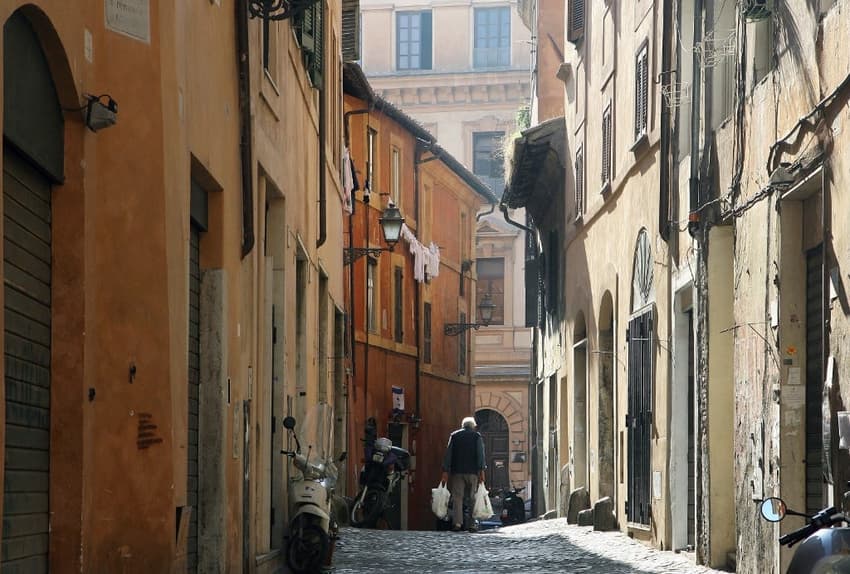Italy approves Holocaust museum for Rome after 20-year wait

Italy's government has approved funding for a long-awaited Holocaust museum in Rome, where nearly 2,000 Jewish people were rounded up during World War II and sent to concentration camps.
A national museum in the capital would "contribute to keeping the memory of the Holocaust alive," read a statement from the government after ministers agreed to fund the project late on Thursday.
The announcement came on the heels of an official visit to Rome last week by Israeli Prime Minister Benjamin Netanyahu.
Italian Culture Minister Gennaro Sangiuliano said 10 million euros had been allocated to begin construction of the museum, a long-delayed project first proposed in the 1990s.
Ruth Dureghello, head of Rome's Jewish community, welcomed the news but called for "definite timeframes and choices that can be made quickly to guarantee the capital of Italy a museum like all the great European capitals".
READ ALSO: Stumble stones: How Rome’s smallest monuments honour Holocaust victims
The architect in charge of the project, Luca Zevi, told AFP the museum should be completed in three years.
Dopo vent’anni prende forma il Museo della Shoah di Roma. Ecco come sarà (di A. Marrocco) https://t.co/B2t8kfMIrR
— L'HuffPost (@HuffPostItalia) March 17, 2023
Symbolically, the museum will be built on land adjacent to the park of Villa Torlonia, the residence of Fascist dictator Benito Mussolini, who was in power from 1922 to 1943.
Mussolini introduced racial laws in 1938 that began stripping civil rights from Jews in Italy and culminating in their deportation.
On October 16, 1943, German troops supported by Italian Fascist officials raided Rome's ancient Ghetto, rounding up and deporting about 1,000 Jewish people.
READ ALSO: Four places to remember the Holocaust in Italy
Subsequent roundups captured another 800 people, and nearly all were killed in the concentration camp of Auschwitz.
The Holocaust saw the genocide of six million European Jews between 1939 and 1945 by the Nazis and their supporters.
Comments
See Also
A national museum in the capital would "contribute to keeping the memory of the Holocaust alive," read a statement from the government after ministers agreed to fund the project late on Thursday.
The announcement came on the heels of an official visit to Rome last week by Israeli Prime Minister Benjamin Netanyahu.
Italian Culture Minister Gennaro Sangiuliano said 10 million euros had been allocated to begin construction of the museum, a long-delayed project first proposed in the 1990s.
Ruth Dureghello, head of Rome's Jewish community, welcomed the news but called for "definite timeframes and choices that can be made quickly to guarantee the capital of Italy a museum like all the great European capitals".
READ ALSO: Stumble stones: How Rome’s smallest monuments honour Holocaust victims
The architect in charge of the project, Luca Zevi, told AFP the museum should be completed in three years.
Dopo vent’anni prende forma il Museo della Shoah di Roma. Ecco come sarà (di A. Marrocco) https://t.co/B2t8kfMIrR
— L'HuffPost (@HuffPostItalia) March 17, 2023
Symbolically, the museum will be built on land adjacent to the park of Villa Torlonia, the residence of Fascist dictator Benito Mussolini, who was in power from 1922 to 1943.
Mussolini introduced racial laws in 1938 that began stripping civil rights from Jews in Italy and culminating in their deportation.
On October 16, 1943, German troops supported by Italian Fascist officials raided Rome's ancient Ghetto, rounding up and deporting about 1,000 Jewish people.
READ ALSO: Four places to remember the Holocaust in Italy
Subsequent roundups captured another 800 people, and nearly all were killed in the concentration camp of Auschwitz.
The Holocaust saw the genocide of six million European Jews between 1939 and 1945 by the Nazis and their supporters.
Join the conversation in our comments section below. Share your own views and experience and if you have a question or suggestion for our journalists then email us at [email protected].
Please keep comments civil, constructive and on topic – and make sure to read our terms of use before getting involved.
Please log in here to leave a comment.